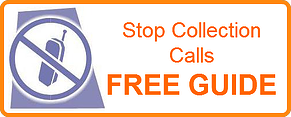If you are having a difficult time keeping up with the minimum payments due on your credit cards or other unsecured debt, you are going to start receiving calls and letters from collectors!
![4191512049_880a892c78_t[1]-resized-600](https://49162.fs1.hubspotusercontent-na1.net/hub/49162/file-14366473.jpg?width=170&name=file-14366473.jpg)
These calls and letters are upsetting and cause stress and fear.
Most likely, you've never been in this situation before and feel helpless and...yes...afraid.
If this is you, then this blog will help!
The worst mistake you can make after receiving a call or letter is to "just ignore" it!
When we open a credit card account (or any other unsecured account), we are signing an agreement/contract that basically says that we agree to the terms the terms of the contract.
If we do not make the required payments when due, then we have broken our promise and the creditor has a right to contact you.
What can you do?
If you can afford to catch up and get back on track, then great, just send the balance due and start making regular minimum payments.
The problem is that most people who find themselves in a stressful financial situation just cannot do this!
There are several reasons you may have gotten into trouble:
- Unemployment
- Divorce
- Serious Illness or Disability
- Trying to make it on a fixed income of Social Security or Retirement Income
- Or other reasons beyond your control
So, if you cannot get caught up and start making the minimum payments due, what options do you have?
Debt Management Program
These used to be called "Credit Counseling".
Basically in the Debt Management or Credit Counseling program, you will make a monthly payment to the company.
The past due balances, fees and interest rates will be modified, but you will end up repaying what you borrowed/charged.
The problem with these types of programs is that the monthly payment is about the same (sometimes a little more) than the previous minimum payment was!
If you can handle this...great!
If not, then you should consider a:
Debt Settlement Program
After 3-4 months of non-payment on your account, the account will most likely be transferred or sold to:
- Internal Recovery Department of the creditor
- Debt Collection Agency
- Law Firm/Debt Collector
- Purchased by a Debt Buyer
At this point, the Collector may be willing to accept a reduced amount called a settlement.
These can be as much as 40% - 80% of the balance, depending on several factors.
Here's a couple of examples:
In a Debt Settlement Program, you will be making a monthly deposit (that you can afford) to a Settlement Savings Fund.
As this fund grows, the company will negotiate with the creditor, collector or attorneys for a settlement agreement.
By the way, there are many so-called Debt Settlement Companies that are NOT registered with the state and violate the laws of what they can charge, etc.
BE VERY CAREFUL!
If a settlement cannot be negotiated, then there is the possibility that the creditor or owner of the account my decide to retain an attorney in order to start legal action.
IF YOU IGNORE THE CALLS AND LETTERS, THIS WILL MOST LIKELY HAPPEN!
YOUR DEBT IS NOT GOING TO JUST "GO AWAY"!
First, you will get a SUMMONS.
The summons legal document stating that the Plaintiff (creditor) has made a legal CLAIM that you (the DEFENDENT) have not met the agreements of the contract.
It will basically say that if you cannot PROVE that you do not owe the CLAIM within 30 days (varies from state-to-state) and submit to the court your Proof called an "ANSWER", then the Plaintiff may petition the court for a DEFAULT JUDGMENT.
If this happens, then the attorney for the plaintiff can petition the court to issue a writ of garnishment or bank levy!
Certain assets and income are exempt, but you have to be very careful!
The point of this is...
DON'T IGNORE THE CALLS AND LETTERS AND LET THIS HAPPEN!
Yes, even if you have a judgment awarded against you, there are ways to stop wage or bank garnishments, but prevention is the best way!
What if you cannot afford a Debt Management Program or a Debt Settlement Program...
Then you may have to consider Bankruptcy.
If you have a wage garnishment awarded, your employer will be legally obligated to send 25% (may be different in some states) of you net, after-tax income to the creditor!
Think about that...
Let's say your take-home, after-tax income is $5000/month.
If you are garnished, your employer would send $1,250 to the creditor per the garnishment order, leaving you only $3750 to pay all your bills!
A Bankruptcy attorney may be able to help.
Check around and interview several.
There should be "no charge" for the initial consultation.
Finally:
If you're in a financial situation where you just can't keep up, DON'T "BURY YOUR HEAD IN THE SAND", reach out for help/options:








 Before I show you how to deal with a wage garnishment here in Oregon (or for most any state), let's get some things straight:
Before I show you how to deal with a wage garnishment here in Oregon (or for most any state), let's get some things straight:


 There is a way to STOP WAGE GARNISHMENT, but it is easier to prevent than to stop!
There is a way to STOP WAGE GARNISHMENT, but it is easier to prevent than to stop!

 you hundreds of dollars!
you hundreds of dollars!
